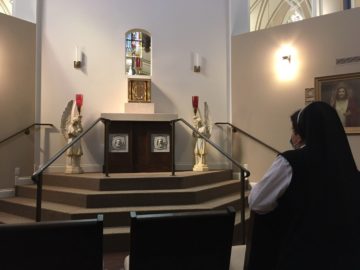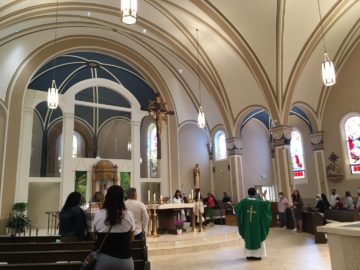Encouraging your reflection for the upcoming weekend liturgy gospel, Fr. Paul Gallagher, OFM offers a Scriptural Reflection on the Twenty-eighth Sunday of Ordinary Time. This content is edited by Franciscan Sister of Christian Charity Sister Anne Marie Lom and Joe Thiel. The excerpts from the Sunday readings are prepared by Joe Thiel. To read or download the complete pdf with excerpts for your prayer, please click here: Franciscan Gospel Reflection October 10 2021 Excerpts are from the Lectionary for Mass for Use in the Dioceses of the United States of America, second typical edition © 2001, 1998, 1997, 1986, 1970 Confraternity of Christian Doctrine, Inc., Washington, DC. Used with permission. All rights reserved. No portion of this text may be reproduced by any means without permission in writing from the copyright owner. Photos: St. Katharine Drexel Eucharistic Chapel, Beaver Dam, Wisconsin
Mark 10:17-30
 As Jesus was setting out on a journey, a man ran up, knelt down before him, and asked him, “Good teacher, what must I do to inherit eternal life?” Jesus answered him, “Why do you call me good? No one is good but God alone. You know the commandments: ‘You shall not kill; you shall not commit adultery; you shall not steal; you shall not bear false witness; you shall not defraud; honor your father and your mother.'” He replied and said to him, “Teacher, all of these I have observed from my youth.” Jesus, looking at him, loved him and said to him, “You are lacking in one thing. Go, sell what you have, and give to the poor and you will have treasure in heaven; then come, follow me.” At that statement his face fell, and he went away sad, for he had many possessions.
As Jesus was setting out on a journey, a man ran up, knelt down before him, and asked him, “Good teacher, what must I do to inherit eternal life?” Jesus answered him, “Why do you call me good? No one is good but God alone. You know the commandments: ‘You shall not kill; you shall not commit adultery; you shall not steal; you shall not bear false witness; you shall not defraud; honor your father and your mother.'” He replied and said to him, “Teacher, all of these I have observed from my youth.” Jesus, looking at him, loved him and said to him, “You are lacking in one thing. Go, sell what you have, and give to the poor and you will have treasure in heaven; then come, follow me.” At that statement his face fell, and he went away sad, for he had many possessions.
Jesus looked around and said to his disciples, “How hard it is for those who have wealth to enter the kingdom of God!” The disciples were amazed at his words. So Jesus again said to them in reply, “Children, how hard it is to enter the kingdom of God! It is easier for a camel to pass through the eye of a needle than for one who is rich to enter the kingdom of God.” They were exceedingly astonished and said among themselves, “Then who can be saved?” Jesus looked at them and said, “For human beings it is impossible, but not for God. All things are possible for God.”
Peter began to say to him, “We have given up everything and followed you.” Jesus said, “Amen, I say to you, there is no one who has given up house or brothers or sisters or mother or father or children or lands for my sake and for the sake of the gospel who will not receive a hundred times more now in this present age: houses and brothers and sisters and mothers and children and lands, with persecutions, and eternal life in the age to come.
Background:
The gospel text from last Sunday ended with Jesus telling the disciples that only those who accept the Kingdom of God like a little child will enter it. After that, Jesus embraced the children about him (Mark 10:15-16). The gospel text for this week directly follows that text.
The man who approaches Jesus is described as having many possessions, and he would have been considered wealthy by people of the day. Two contradictory assumptions were held about the wealthy. The first is that they had gotten their wealth by taking advantage of others. This is the attitude that people had toward tax collectors found in the scriptures. In contrast, wealth could also be understood as a sign of being favored by God. Job’s status in the beginning of the book of Job would represent that basis. But we also might think of the scribes who notice the contributions of the wealthy, but are blind to the contribution that the poor widow makes upon entering the temple.
Mark recounts the young man running up to Jesus with his question about eternal life. Normally, public compliments, i.e. “good teacher,” are given as a setup to challenge one’s character or reputation. But this young man does not seem to be setting Jesus up for an embarrassing question with his compliment. He comes instead with a question that is important to him, and he seeks out Jesus for his wisdom. He may be wealthy, but he is also a person who is sincere in his effort to be counted among God’s faithful. His sincerity is also manifested in the fact that he takes Jesus’ response to his question seriously, and goes away sad because has discovered he is not as willing to do what is required as he might have anticipated.
Jesus’ dialogue with the disciples indicates his awareness that his teaching here is difficult for even his most faithful disciples to hear. It goes against the presumption of the day that wealth is a sign of blessing. And it goes against the presumption that one earns eternal life by what one does, whether that is keeping the law and traditions, or leaving the security of home and family to become a disciple of a holy one like Jesus. The problem with wealth is that it can hinder one from living in a way that develops a real sense of trusting the goodness of God. Wealth is not the issue. The young man was seeking to take possession of eternal life in a manner similar to inheriting his wealth.
 Peter’s response to Jesus’ teaching indicates the type of reaction that those who had chosen to become disciples would have to Jesus’ teaching. This kind of radical dependency is not natural, especially for men of the day. Jesus seeks to reassure them that their efforts are recognized and blessed. But he also seems to indicate that eternal life, sharing in the very life of God, is not something anyone earns or is entitled to receive. It is always God’s gift and must be received always as a gift.
Peter’s response to Jesus’ teaching indicates the type of reaction that those who had chosen to become disciples would have to Jesus’ teaching. This kind of radical dependency is not natural, especially for men of the day. Jesus seeks to reassure them that their efforts are recognized and blessed. But he also seems to indicate that eternal life, sharing in the very life of God, is not something anyone earns or is entitled to receive. It is always God’s gift and must be received always as a gift.
Reflection Questions:
- As this gospel unfolds, Jesus is described as setting out on a journey when a young man comes up and kneels before him. Peter and at least some of the other disciples are present. How do you imagine this taking place? Near the exit of the town, at first light, or toward evening when the day starts to cool? Are there others in the background who notice these interactions between Jesus and the young man and Jesus and his disciples? How do the voices and faces change as this situation unfolds? What else does your imagination let you notice?
- Have you ever thought about what you might inherit? Is there a special item that has been in your family for generations or a memento that has special significance?
- This young man wants to inherit eternal life. What does that say to you?
- The text says that Jesus looked at the young man, loved him, and then addressed him. As you imagine Jesus looking at this young man with love, what thoughts and feelings do you experience?
- Jesus tells the young man to give his possessions to the poor and he will have treasure in heaven. Do you ever think about having treasure in heaven?
- Have you ever had difficulty parting with your possessions or a particular possession that had special meaning? What helped you let go?
- Do you hang on to other things like hurts, memories, and options more tightly than possessions? What has helped you to let them go?
- In the final section of the gospel text for today, Peter asks about those like himself who have given of their life to become Jesus’ followers. Do you look upon your life as having given up things to be Jesus’ disciple?
- Can you talk to God now about your own concerns, hopes, or fears around eternal life, or anything else that arose while praying with this gospel?


